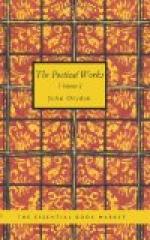malicious glosses, all men of reason conclude credible.
If there be anything more than this required of me,
I must believe it as well as I am able, in spite of
the witnesses, and out of a decent conformity to the
votes of parliament; for I suppose the Fanatics will
not allow the private spirit in this case. Here
the infallibility is at least in one part of the government;
and our understandings as well as our wills are represented.
But to return to the Roman Catholics, how can we be
secure from the practice of Jesuited Papists in that
religion? For not two or three of that order,
as some of them would impose upon us, but almost the
whole body of them are of opinion, that their infallible
master has a right over kings, not only in spirituals
but temporals. Not to name Mariana, Bellarmine,
Emanuel Sa, Molina, Santare, Simancha,[85] and at
least twenty others of foreign countries; we can produce
of our own nation, Campian, and Doleman or Parsons;
besides, many are named whom I have not read, who
all of them attest this doctrine, that the pope can
depose and give away the right of any sovereign prince,
si vel paulum deflexerit, if he shall never
so little warp: but if he once comes to be excommunicated,
then the bond of obedience is taken off from subjects;
and they may, and ought to drive him, like another
Nebuchadnezzar, ex hominum Christianorum dominatu,
from exercising dominion over Christians; and to this
they are bound by virtue of divine precept, and by
all the ties of conscience, under no less penalty than
damnation. If they answer me, as a learned priest
has lately written, that this doctrine of the Jesuits
is not de fide; and that consequently they
are not obliged by it, they must pardon me, if I think
they have said nothing to the purpose; for it is a
maxim in their church, where points of faith are not
decided, and that doctors are of contrary opinions,
they may follow which part they please; but more safely
the most received and most authorised. And their
champion Bellarmine has told the world, in his Apology,
that the king of England is a vassal to the pope,
ratione directi domini, and that he holds in
villanage of his Roman landlord: which is no new
claim put in for England. Our chronicles are
his authentic witnesses, that King John was deposed
by the same plea, and Philip Augustus admitted tenant.
And which makes the more for Bellarmine, the French
king was again ejected when our king submitted to
the church, and the crown was received under the sordid
condition of a vassalage.
It is not sufficient for the more moderate and well-meaning Papists, of which I doubt not there are many, to produce the evidences of their loyalty to the late king, and to declare their innocency in this plot: I will grant their behaviour in the first to have been as loyal and as brave as they desire; and will be willing to hold them excused as to the second, I mean when it comes to my turn, and after my betters; for it is




